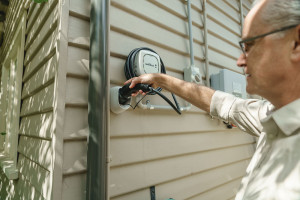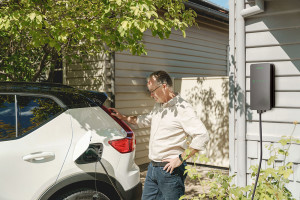Guest post by Vishv Chauhan
How Home EV Charging Can Save You Time and Money
If you’re reading this, chances are you’re either a proud electric vehicle (EV) owner or thinking about becoming one. While driving an EV is a great way to reduce your carbon footprint and save on fuel costs, have you ever thought about the benefits of charging your car at home? Home EV charging can not only save you time and money but also make your life a lot more convenient. Let’s dive into the details and see how home charging stacks up against public charging.
The Convenience of Charging at Home
One of the biggest perks of owning an EV is the ability to charge it at home. Imagine waking up every morning to a fully charged car, ready to hit the road. No more detours to service stations for unleaded petrol, diesel or public charging stations where you could wait in line. Here’s how home charging can simplify your life:
Charge While You Sleep
Plugging in your EV when you get home is like setting your coffee machine to brew in the morning. It’s that simple. According to a survey by the Electric Vehicle Council, 80% of EV owners prefer to charge their vehicles at home overnight. This way, your car is ready to go by the time you wake up, just like your morning cup of coffee.
Avoid the Queue
Public charging stations can be a mixed bag. Sometimes you get lucky, and there’s an available spot; other times, you end up waiting for what feels like forever. With a home charger, you never have to worry about waiting in line. You’re in control of your charging schedule.
Skip the Public Charging Station
 Charging your EV at home can save you a lot of time compared to public charging stations. Each trip to a public charger, including driving, waiting, and charging, can easily take around 60 minutes. If you’re doing this twice a week, that’s about 104 hours per year spent on public charging trips. By switching to home charging, you could save nearly all this time, except for the few minutes it takes to plug in your car each night. This means you could be saving about 100 hours annually. Sources from Canary Media and EVBox support these findings, highlighting the efficiency and convenience of home EV charging compared to the hassles of public charging.
Charging your EV at home can save you a lot of time compared to public charging stations. Each trip to a public charger, including driving, waiting, and charging, can easily take around 60 minutes. If you’re doing this twice a week, that’s about 104 hours per year spent on public charging trips. By switching to home charging, you could save nearly all this time, except for the few minutes it takes to plug in your car each night. This means you could be saving about 100 hours annually. Sources from Canary Media and EVBox support these findings, highlighting the efficiency and convenience of home EV charging compared to the hassles of public charging.
Saving Money, One Kilowatt at a Time
Charging your EV at home is generally cheaper than using public chargers or filling up with gasoline. Here’s how you can save:
Lower Costs
Charging an electric vehicle (EV) at home in Australia is much cheaper than using public fast chargers. Home charging costs around $0.20 to $0.30 per kilowatt-hour (kWh), so charging a typical 60 kWh EV battery would cost between $12 and $18, depending on your location and electricity plan. Public fast chargers, on the other hand, can cost between $0.40 and $0.70 per kWh, which makes them significantly more expensive (sources: Drive, Canstar Blue, and Online Auto).
Off-Peak Savings
According to the Australian Energy Market Commission, EV owners in Australia who charge their vehicles during off-peak hours can save up to 40% on electricity costs compared to peak-hour charging. This significant saving is due to lower electricity rates during off-peak times, which typically occur late at night or early in the morning (source: NBER and Climate Works Centre). This can make a substantial difference in the overall cost of owning and operating an electric vehicle, as charging costs are a major component of the total cost of ownership.
Solar Power
If you have solar panels, you can charge your EV with the energy generated from the sun. This not only reduces your electricity bill but also makes your driving experience even greener. A study by the Australian Renewable Energy Agency found that using solar power to charge an EV can reduce charging costs by up to 70%.
Home Charging Myths Busted
There are some myths out there about home charging, so let’s set the record straight:
Myth: Home Charging is Complicated
 The truth is, if you can plug in a phone, you can charge an EV. Most modern home chargers are plug-and-play, making the process straightforward. You don’t need to be a tech wizard to get it right.
The truth is, if you can plug in a phone, you can charge an EV. Most modern home chargers are plug-and-play, making the process straightforward. You don’t need to be a tech wizard to get it right.
Myth: Home Chargers are Expensive
In Australia, the initial cost of a home EV charger can range from $1,000 to $2,500, including installation. While this may seem like a significant upfront expense, the long-term savings on fuel and public charging fees often justify the investment. According to the Australian Electric Vehicle Association, switching to home charging can save the average EV owner around $1,200 to $1,500 annually on fuel costs compared to petrol vehicles. Over several years, these savings can more than offset the initial cost of the charger, making home charging a cost-effective solution in the long run.
Myth: Charging at Home Takes Too Long
For most Australians, who drive an average of 37 km per day, overnight charging is more than adequate. A typical home charger can fully recharge an EV in 6 to 8 hours, which is well within the time most people spend at home each night. Even for longer commutes, modern home chargers provide fast-charging options that can deliver a substantial charge in just a few hours. For instance, a Level 2 home charger can add up to 40 km of range per hour, easily covering the daily driving needs of the majority of Australian EV owners.
How to Get Started with Home Charging
Getting set up with a home charger is easier than you might think. Here’s a quick guide:
Assess Your Needs
 Before purchasing a home EV charger in Australia, it’s essential to consider your daily driving distance and charging habits to determine the right charger for you. For example, if you drive around 60 km a day, a Level 2 charger, which can deliver approximately 20-30 km of range per hour of charging, would be ideal. This type of charger will ensure your vehicle is fully charged overnight, providing enough range for daily commuting and activities. Evaluating your driving needs will help you select a charger that meets your lifestyle and ensures efficient and cost-effective home charging.
Before purchasing a home EV charger in Australia, it’s essential to consider your daily driving distance and charging habits to determine the right charger for you. For example, if you drive around 60 km a day, a Level 2 charger, which can deliver approximately 20-30 km of range per hour of charging, would be ideal. This type of charger will ensure your vehicle is fully charged overnight, providing enough range for daily commuting and activities. Evaluating your driving needs will help you select a charger that meets your lifestyle and ensures efficient and cost-effective home charging.
Check Your Electrical Setup
Make sure your home’s electrical system can handle the charger. You might need to upgrade your electrical panel or install a dedicated circuit, but this is usually a straightforward process. An electrician can help you assess your setup and make any necessary upgrades.
Hire a Pro
It’s always a good idea to hire a professional to install your charger. This ensures that everything is set up correctly and safely.
Real-World Benefits
To give you a better idea of how home charging can make a difference, let’s take a look at a real-world example.
The Environmental Impact
Charging your EV at home isn’t just good for your wallet; it’s also better for the environment. By using home energy sources, especially renewable ones like solar, you can reduce your carbon footprint. A study by the University of Michigan found that the average EV produces 60% fewer emissions than a gasoline vehicle when charged with grid electricity. This number improves even more when renewable energy sources are used.
Challenges of Home Charging
Of course, home charging isn’t without its challenges. Here are a few things to consider:
Initial Cost
The upfront cost of a home charger and potential electrical upgrades can be a barrier for some. However, many governments offer rebates and incentives to offset these costs. For instance, in Australia, the Victorian government offers rebates of up to $1,000 for the installation of home EV chargers.
Space Requirements
 Not everyone has a garage or dedicated parking space where they can install a home charger. If you live in an apartment or a house without a driveway, you might need to explore other options, such as workplace charging or public charging stations near your home.
Not everyone has a garage or dedicated parking space where they can install a home charger. If you live in an apartment or a house without a driveway, you might need to explore other options, such as workplace charging or public charging stations near your home.
Learning Curve
There can be a bit of a learning curve when it comes to managing your charging habits and understanding your electricity usage. However, most EV owners find that they quickly adapt and that the benefits far outweigh the initial challenges.
Future of Home Charging
The future of home EV charging looks bright. As technology advances, we can expect chargers to become more efficient, faster, and even more affordable. Innovations like bidirectional charging (which allows your EV to send electricity back to the grid or your home) and smart chargers (which can optimise charging times based on energy prices and availability) are on the horizon. These advancements will make home charging an even more compelling option for EV owners.
Conclusion
In a nutshell, home EV charging is a game-changer. It offers unmatched convenience, significant cost savings, and a host of environmental benefits. Whether you’re a new EV owner or just considering making the switch, setting up a home charger is a smart move.
For more detailed information on getting started with home EV charging and finding the best solutions for your needs, check out the resources available at JET Charge. They provide comprehensive guides and support to help you every step of the way.
Happy charging, and here’s to a greener future!

